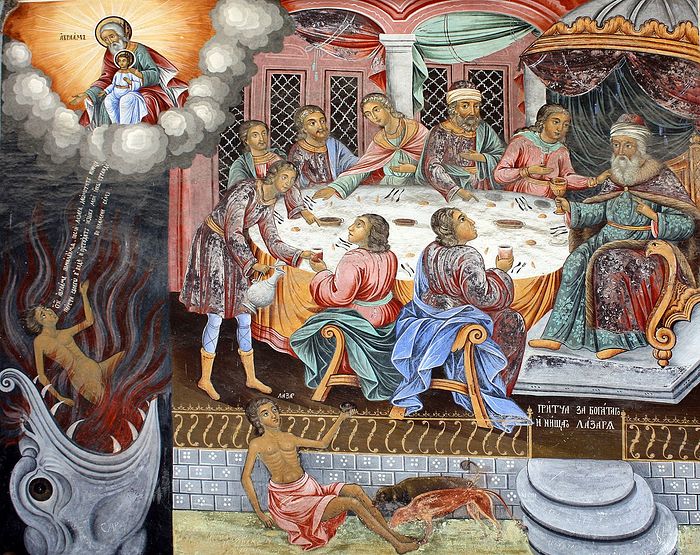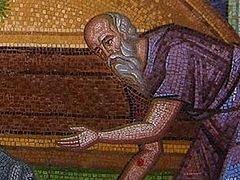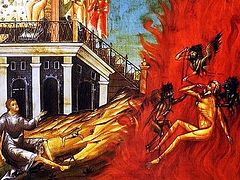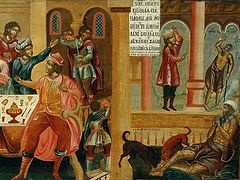In the recent texts of the Lenten Triodion we are reminded repeatedly of Christ’s parable of poor Lazarus and the rich man:
The wealth of my lusts has made me like the rich man who lived each day in luxury. Therefore I pray to Thee: deliver me from the fire as thou hast delivered Lazarus, O Saviour.
I am clothed in sensual pleasures, O Saviour, like the rich man who was clothed in fine linen and in golden ornaments and raiment. But send me not into the fire as he was sent.
The rich man once rejoiced in the wealth and luxury of this corruptible life, and so he was condemned to torment; but Lazarus the poor man gained rest and refreshment (Lenten Triodion for the Fifth Sunday, Matins, Canticle One).1
O Christ, as Thou hast saved Lazarus from the flame, deliver me, Thine unworthy servant from the fire of Gehenna.
O Lord, in passions and lusts I am as wealthy as the rich man, yet in my lack of virtues I am as poor as Lazarus. But do Thou save me.
The rich man was clothed in scarlet and fine linen through his lusts and sins; and so he burns in the flames (Canticle Three).
The rich man delighted in sumptuous food and raiment, while Lazarus longed to be fed with the crumbs from his table.
With their tongues the dogs licked the sores of Lazarus the beggar, showing toward him in his need a compassion that the rich man never felt.
Once Lazarus in poverty and distress lay an outcast at the gate of the rich man; but now he is glorified (Canticle Four).
When the rich man saw Lazarus resting in Abraham’s bosom and rejoicing in light and glory, he cried out: “O Father Abraham, take pity on me, for I am condemned to the fire and my tongue burns in bitter torment.”
“During thy life,” said Abraham to the rich man, “thou hast lived in wealth and luxury; so now thou art tormented in the fire eternally, while Lazarus the poor man rejoices in unending gladness.”
I am rich in the deceptive joys of this life, like the rich man who spent all his days in pleasure; but, I pray Thee, loving Lord, in Thy compassion deliver me from the fire as Thou hast saved Lazarus (Canticle Five).
The rich man condemned himself to the flames of fire by his life of pleasure; but Lazarus the poor man chose penury in this present life, and so was counted worthy to dwell with Abraham, and he received eternal life, O Christ; but the rich man was condemned to the fire, there to be tormented in both soul and body.
The rich man was condemned to the fire, because of Lazarus: condemn me not in my wretchedness, I pray, O Lord who lovest mankind; but count me, like Lazarus, worthy of Thy light (Canticle Six).
Like Job of old, who sat on a dung-heap full of rottenness and worms, Lazarus lay before the gates of the rich man, and he cried aloud: “O God of our fathers, blessed art Thou.
An outcast at the gate of the rich man who lacked all compassion, Lazarus longed for the curmbs that fell from his table, yet no man gave them to him; but in return for all this he received a dwelling-place with Abraham.
O my Christ, I pray Thee, deliver me from the punishment of the rich man who showed no compassion; but place me with Lazarus the poor man, and count me worthy to cry unto Thee in thanks-giving: O God of our fathers, blessed art Thou (Canticle Seven).
Once the rich man in his vileness was splendidly clothed in scarlet raiment and fine linen and purple while the poor man Lazarus lay a pitiable outcast at his gate, longing to eat the crumbs that fell from his table; and no man gave them to him. But now he reigns with Christ in glory.
Lazarus lay at the gates of the rich man, his body putrefying with sores: he longed to eat, and no man gave him food; but the dogs, moved by compassion, licked his wounds with their tongues. And now he has been counted worthy of joy in Paradise.
I have grown rich in sensual pleasures, like the rich man of old who clothed himself each day in scarlet; and delighting in the good things of this life, I have condemned myself to luxury and deception. And so I pray to Thee, O greatly merciful Christ: deliver me forever from the eternal fire (Canticle Eight).
I pray to Thee, O Christ, since Thou art God by nature: make me poor like Lazarus, banishing my sensual desires; but in virtues make me as wealthy as the rich man, that with faith I may magnify Thee in hymns.
Rich and unmerciful, I have despised my mind; cast out in wretchedness it lies with faith before the gates of Thy commandments, O Lord who lovest mankind. But in Thy tender mercy and compassion, raise it up as once in tender love thou hast raised up Thy friend Lazarus, who was four days dead.
We have all learned the meaning of this parable of the Lord. Let all of us, then hate the rich man’s lack of compassion, that we may escape punishment and rejoice for ever with Abraham (Canticle Nine).
On the Sunday before we enter the final week of Great and Holy Lent, which precedes Lazarus Saturday, the Church drives home to us a very important and conclusive message. The teaching in this parable of the rich man and Lazarus is very clear to us on one of its levels: It is very hard for a rich man to enter the Kingdom of Heaven (cf. Matt, 9:24; Mk. 10:25; Lk. 18:25), but blessed are the poor in spirit: for theirs is the Kingdom of Heaven (Matt. 5:3). As we may fast from the sumptuousness of the rich man we nevertheless long for those things he has—so we are that rich man. And if we disdain the poor in their need—we are that rich man. But if we endure the strain of fasting and humble ourselves, not complaining about our lot, we are like Lazarus who lies just outside the gates of those who enjoy the luxuries of life; but our reward is potentially to live forever in blessedness, in the bosom of Abraham. The moral lesson is clear.
Blessed Theophylact in his explanation of this Gospel parable writes:
The Lord, then, fashioned this story to teach those who show no mercy and give no alms what punishments await them, and to teach those who are suffering what good things they will enjoy on account of the sufferings they patiently endure in this life. The Lord gave no name to the rich man in this parable, because such a man is not worthy to be remembered by God by name. As the Lord says, through the prophet, nor will I make remembrance of their names through My lips (Ps. 15:3). But the Lord mentions the poor man by name, for the names of the righteous are inscribed in the Book of Life.2
Blessed Theophylact notes that this was not a real event but a parable. However, as we are now setting our sights toward the raising of another Lazarus—a real event, concerning a man who really did rise from the dead for all to see—the Church prepares us for the lessons and experiences of Holy Week, in which we see clearly that many did not believe in Christ, though they saw one who rose from the dead. The rich man, albeit too late as he was already suffering the torments of hell, said, I pray thee therefore, father, that thou wouldest send him to my father’s house: for I have five brethren; that he may testify unto them, lest they also come into this place of torment. Abraham saith unto him, They have Moses and the prophets; let them hear them. And he said, Nay, father Abraham: but if one went unto them from the dead, they will repent. And he said unto him, If they hear not Moses and the prophets, neither will they be persuaded, though one rose from the dead (Lk. 27–31).
The next level of this parable is thus pointing us in the direction of Holy Week, as Blessed Theophylact goes on to explain:
There are those even now who say the same: “Who knows what is in hades? Who has ever come from there to tell us?” But let them hear Abraham who says that if we do not give heed to the Scriptures, we will not believe even those who come from hades. The Jews showed this to be true. Because they gave no heed to the Scriptures, they did not believe when they saw the dead resurrected, but even attempted to slay that other Lazarus who was four days dead. Many of the dead arose at the Lord’s Crucifixion, yet this only intensified the Jews’ murderous assault against the apostles. If raising the dead would truly help us to believe, the Lord would do this often. But there is no help so great as the close study of the Scriptures. For the devil by trickery has appeared to raise the dead and by this means has deceived the foolish; and concerning those in hades he spreads doctrines worthy of his own wickedness. But no such trickery can prevail against those who make wise study of the Scriptures. For the Scriptures are a lamp and a light, and when light shines, the thief appears and is discovered. Therefore, let us believe the Scriptures and let us not seek out resurrections from the dead.
There is also hint in this parable at the apostolic times to come, in which the Gentiles, who like Lazarus lay “outside the gates”, are then taken into the bosom of Abraham, who was not a Jew but became the father of the chosen race. Blessed Theophylact:
The parable may also be understood in a more figurative sense. The rich man represents the Hebrew people. Of old this people was rich in all knowledge and wisdom, and in the words of God, which are more precious than gold and many costly stones. And this people was clothed in purple and fine linen, having both kingship and priesthood, being a royal priesthood to God. The purple signifies kingship and the fine linen priesthood, for the Levites used fine linen cloth for the priestly vestments. The Hebrews fared sumptuously everyday. Everyday they offered morning and evening sacrifices, which were called the constant offering. Lazarus represents the people from among the Gentiles, destitute of divine grace and wisdom, lying before the gates. For the Gentiles were not permitted to enter the house of God; this was considered a defilement, as when, in the Book of Acts, an outcry was made against Paul for bringing Gentiles into the temple and defiling that holy place. The Gentiles were covered with the sores of festering sin, on which impudent dogs,3 the demons, were feeding. For our sores are pleasure to the demons. And the Gentiles longed for the crumbs which fell from the table of the rich man. They had no share at all of that bread which strengtheneth man’s heart, and they were in need of those most subtle and refined particles of the rational food, like the Canaanite woman desired to be fed from the crumbs, even though she was a Gentile.
We are also warned, because “apostolic times” are not really over—people previously deprived of God’s word are still being brought into the fold of Orthodox Christianity—we must never become complacent in the faith of our fathers, assuming our birth into the Orthodox Faith alone will save us. No, we have to give what we have to others, not be stinting, because that will save both us and them. Otherwise we will become stiff like the Pharisees:
What then? The Hebrew people died to God, and their bones, which made no movement towards the good, became stiff in death. But Lazarus, the Gentile people, died to sin, and the Jews, who died in their sins, burn with the flame of spite. They are envious, as the Apostle says, that the Gentiles have been accepted unto faith, and that the people of the nations, who before were destitute and dishonored, are now in the bosom of Abraham, the father of the nations, and rightly so. For Abraham, himself a Gentile, believed in God, and changed from idolatry to the knowledge of God. Therefore it is right that those who share in his change and in his faith should also find rest in his bosom, and inherit his same portion, dwelling place, and store of good things. The Jew desires just one drop of the old sprinklings and purifications of the law in order to cool his tongue, that he might have the boldness to say to us that the law is still in effect. But he does not obtain his desire.
Profound is this bridge in our Lenten services from the parabolic Lazarus to the real Lazarus who was four days dead, who became an apostle to the Gentiles after the glorious resurrection of his Teacher, Christ. Let us also strip ourselves of the pride of life that the rich man typifies, and become that Lazarus who endured much but received his reward. And let us not take our purple robes for granted, but always look for ways to adorn the poor with them, to share our abundance with them, both material and spiritual.




